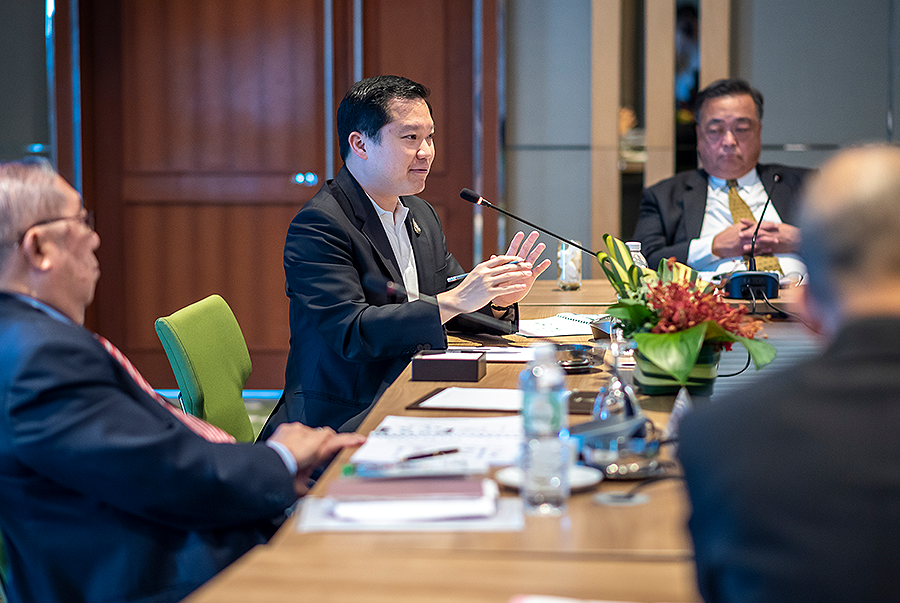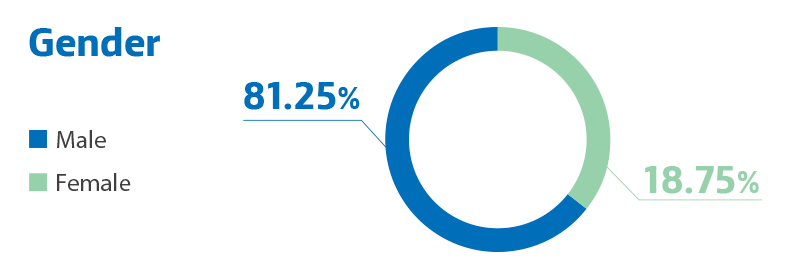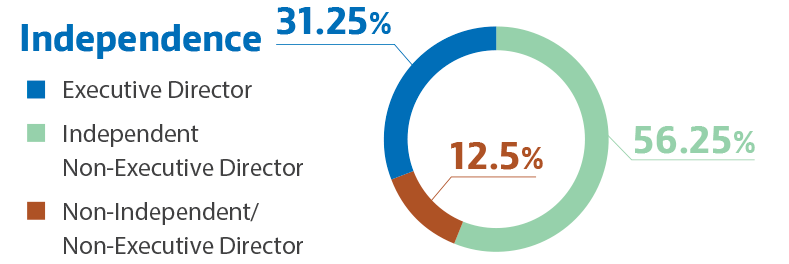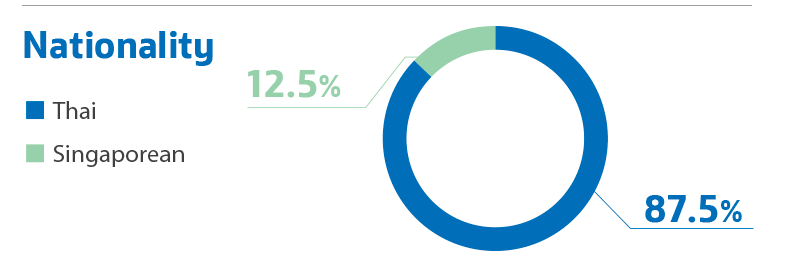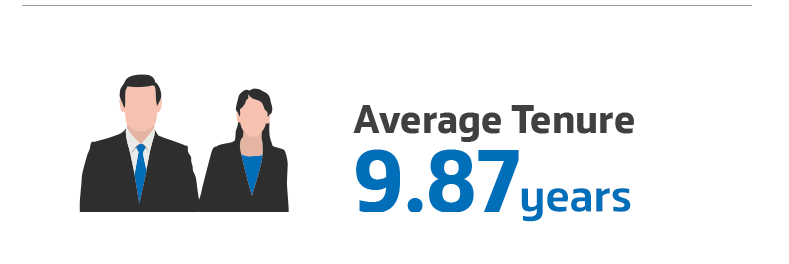ThaiBev Group monitors regulatory and legal changes in Thailand through its legal department. The Group tracks law changes through being a membership of the Thai Chamber of Commerce, the Federation of Thai Chambers of
Commerce, and the Federation of Thai Industries, as well as seeking legal information laws and news from the websites
of government agencies such as the Secretariat of the
Prime Minister, the Secretariat of the Cabinet, the Secretariat of the House of Representatives, the Thai government gazette, the Office of the Council of State, and the Revenue
Department. In the fiscal year 2023, ThaiBev Group has adjusted its operating policy to be in line with the legal measures as follows:
-
This Act took effect on February 7, 2023, and amended several provisions regarding limited companies, such as allowing limited companies to use electronic methods in board meetings, reducing the notification requirements for calling shareholder meetings of limited companies with only registered shares and no bearer shares to only sending a registered letter to shareholders by mail without advertising the notice in a local newspaper, and increasing the quorum for shareholder meetings to require at least two shareholders or proxies to be present.
In the case of notification of shareholder meetings, ThaiBev Group’s articles of association were prepared in accordance with the old laws. With the amendment of the laws, the companies’ articles of association needed to be amended to comply with the new laws. As a result, the companies will be able to send a registered letter to shareholders by mail without advertising the notice in a local newspaper. ThaiBev Group is preparing to amend the articles of association of all limited companies registered under
Thai law in accordance with the amended laws at the annual general meeting to be held after the end of the 2023 fiscal year. This is to ensure that each company can be more efficient in sending notifications of shareholder meetings in the future.
-
According to the Ministerial Regulations No. 3 (B.E. 2535) issued under the Factory Act B.E. 2535, as amended by
the Ministerial Regulations No. 28 (B.E. 2566), Clause 8; factories, as defined in the Factory Act, that generate or contain waste or unused materials, or that dispose of, treat, or handle waste or unused materials, are required to prepare a report on waste or unused materials. The Department of Industrial Works, Ministry of Industry,
has therefore amended and improved the criteria for managing waste or unused materials in factories as defined by the Factory Act.
These criteria were outlined
in the Notification of the Ministry of Industry on the Management of Waste or Unused materials B.E. 2548.
The amendment aims to make the criteria more suitable, and a new announcement was issued in B.E. 2566 (replacing the previous one) to establish criteria for reporting the management of waste or unused materials. This includes an expansion of the responsibility of the waste generator.
Unlike the previous practice where responsibility ended upon delivery to the waste processor responsible for managing waste or unused materials, now the responsibility concludes when the waste or unused materials have been managed to completion. The waste generator must control the waste processor to manage waste or unused materials appropriately, in accordance with academic principles, safely, without adverse environmental impacts, and within the legal timeframe. This is in line with the principle that the polluter
pays, known as the Polluter Pays Principle (PPP).
The aforementioned announcement came into effect
on November 1, 2023, except for the reporting of the management of waste or unused materials, which became effective from June 1, 2023, onwards.
Therefore, ThaiBev Group has adjusted its processes for managing waste or unused materials to comply with
the amended laws. ThaiBev Group has reported on the management of waste or unused materials within the specified timeframe. Additionally, ThaiBev Group has implemented measures to control and oversee its waste processors responsible for managing waste or unused materials, ensuring strict compliance with the newly revised criteria.
This is to prevent adverse impacts on the surrounding areas, the environment, and society from the operations of ThaiBev Group. Furthermore, ThaiBev Group has prepared contingency plans in case the waste processors responsible for managing waste or unused materials fail to complete the management within the legally defined timeframe. This proactive approach ensures prompt handling of waste or unused materials
in the event of such occurrences.
-
According to the Excise Tax Act B.E. 2560, any person
who wishes to produce liquor shall submit an application to the Director General of the Excise Department.
The application for and issuance of a license shall be in accordance with the criteria, methods, and conditions prescribed in the Ministerial Regulation.
Before the issuance of the Ministerial Regulation on Liquor Production B.E. 2565, liquor producers were required to comply with the Ministerial Regulation on Liquor Licensing B.E. 2560 (“the Ministerial Regulation
B.E. 2560”).
The Ministerial Regulation B.E. 2560 divided applicants into two categories:
1) large-scale liquor industries that are factories under the Factory Act using machinery with a total capacity of at least 5 horsepower and/or employ at least 7 workers. These industries must also meet the qualifications and characteristics of a factory for the type of liquor they are licensed to produce, as specified in the Ministerial Regulation B.E. 2560; and
2) community liquor production facilities that are not factories under the Factory Act, using machinery with a total capacity of less than 5 horsepower and/or employ less than 7 workers.
In 2022, the government issued the Ministerial Regulation on Liquor Production B.E. 2565 (“the Ministerial Regulation B.E. 2565”), which replaced the Ministerial Regulation
B.E. 2560. The Ministerial Regulation B.E. 2565 took effect on November 2, 2022. The Ministerial Regulation B.E. 2565 revised the categories of applicants to align with the definition of “factory” under the Factories Act B.E. 2535
(as amended in 2019).
The Ministerial Regulation B.E. 2565 divides applicants into three categories:
1) large-scale liquor industries which must be factories under the amended Factories Act using machinery with a total capacity of at least 50 horsepower and/or employ at
least 50 workers. These industries must also meet the qualifications and characteristics of a factory for the
type of liquor they are licensed to produce, as specified in the 2022 Ministerial Regulation;
2) medium-sized liquor industries that use machinery with a total capacity of at least 5 horsepower but less than 50 horsepower and/or employ at least 7 workers but less than 50 workers; and
3) small-scale liquor industries that use machinery with
a total capacity of less than 5 horsepower and/or employ less than 7 workers. The revision of these criteria allows small-scale liquor producers who have held a liquor production license for at least one year to apply
for a license to expand their production capacity to
medium-sized liquor industries that use machinery
with a total capacity of at least 5 horsepower but
less than 50 horsepower and/or employ at least 7
workers but less than 50 workers.
In addition, the Ministerial Regulation B.E. 2565 revised the criteria for obtaining a license to produce fermented liquor in type of beer under the Ministerial Regulation
B.E. 2560. The Ministerial Regulation B.E. 2565 revokes the requirement of a minimum registered capital of 10 million Baht and a minimum production capacity of 10 million liters per year (for applicants who are industrial producers of fermented liquor in type of beer that are not produced for sale at the production site) and 100,000 liters per year but not more than 1 million liters per year (for applicants who are industrial producers of fermented liquor in type
of beer that are produced for sale at the production site (Brewpub)). This revision of the criteria makes it easier to obtain a license to produce fermented liquor in type of beer under the Ministerial Regulation B.E. 2565 as there are no longer any restrictions on registered capital or minimum production capacity.
ThaiBev Group must therefore prepare for the changes
in the law by maintaining the quality and standards of its existing products, developing new products continuously to meet the needs of consumers, and creating brand recognition for ThaiBev Group products. In addition, ThaiBev Group has a business opportunity to increase the production of fermented liquor in type of beer for sale at the production site to provide a new option for consumers.
Examples of Support for Various Organizations
ThaiBev is committed to participating in activities with non-profit organizations to help enhance competitiveness at both the corporate and national levels. There are ThaiBev executives on both the Advisory Committee and the Steering Committee of the TMA Center for Competitiveness. In addition, ThaiBev continues to support the TMA’s budget
for activities such as seminars on technology and innovation.
Recognizing the importance of sustainable development
in the private sector, ThaiBev joined the UN Global Compact (UNGC) on 24 July, 2019. The UNGC is the United Nations’ framework for sustainable development cooperation. It aims to strengthen cooperation amongst companies in all industry sectors, foundations, and non-profit organizations and encourages all parties to be mindful of sustainability in their operations in line with the UNGC’s ten global principles.
These ten principles cover four key dimensions,
anti-corruption, labor standards, human rights, and
environmental protection. ThaiBev recognizes that the protection and conservation of natural resources and the environment are key to sustainable development. Therefore, it is committed to operating in accordance with circular economy principles. It is also dedicated to continual
development of more efficient and environmentally friendly practices in energy, water, packaging materials, and waste.
ThaiBev foresees that its commitment will further increase as a member of the Global Compact Network Thailand (GCNT),
if it is to help achieve UN Sustainable Development Goal 17, which refers to “cooperation for sustainable development”.
In the past, the company has supported and participated in important activities for the GCNT such as publishing ThaiBev sustainability articles as models for other businesses.
Established in 2019 as a collaboration between nine
Thai private companies, the TSCN has three key objectives: to protect the value of investment, focusing on business continuity; to enhance investment value by building partnerships and developing the efficiency of existing operations (e.g. cross-selling, cross-training, joint
investment, resource-sharing); and to jointly create
innovations and expand investment in collaborative projects, especially new ones (e.g. creating an online platform with venture funds for startups, cross-sharing employee skills, and using program developers). In 2023, the TSCN was again instrumental in organizing the regional sustainability exhibition, Sustainability Expo 2023, in Bangkok.
ThaiBev was chair of the TUBLC from 2018 until November 2022 and has continued to support the council as its honorary chair. ThaiBev is committed to promoting growth and driving the economic progress of both countries, through discussions and exchanges of ideas between the public and private sectors, and the promotion of trade and investment opportunities for Thai and UK entrepreneurs.
Key contributions over the past year have included a virtual meeting with Dominic Johnson, the UK Minister for
Investment, to discuss further investment expansion plans and the support that is necessary for investors. We attended a TUBLC meeting with Mark Garnier, the UK Prime Minister’s Trade Envoy, together with Thailand’s Department of Trade Negotiations, Ministry of Commerce, and Ministry of Foreign Affairs, to discuss ways forward for the Joint Economic and Trade Committee (JETCO) and the launch of the Enhanced Trade Partnership (ETP) in the following year, which could potentially lead to a comprehensive free-trade agreement.
Thailand-Vietnam Business Council and Thailand-Vietnam Friendship Association work closely to strengthen
relationship and drive collaboration to overcome business challenges to enhance trade and investment opportunities for mutual prosperity of both countries.
As a committee member of both organizations, ThaiBev actively supported the organizations’ activities in particularly the 1st
Thailand-Vietnam Business Forum which was successfully held in Thailand amid the Asia-Pacific Economic Cooperation (APEC) Meetings in November 2022. The President of Vietnam placed importance and attended the event to confirmed the amicable relations between both countries.
In July 2023, ThaiBev enhanced its support as a main sponsor for the 2nd Thailand-Vietnam Business Forum to further strengthen comprehensive cooperation of Thailand and Vietnam and extend business networks between Thai
and Vietnamese young entrepreneurs and start-ups.
